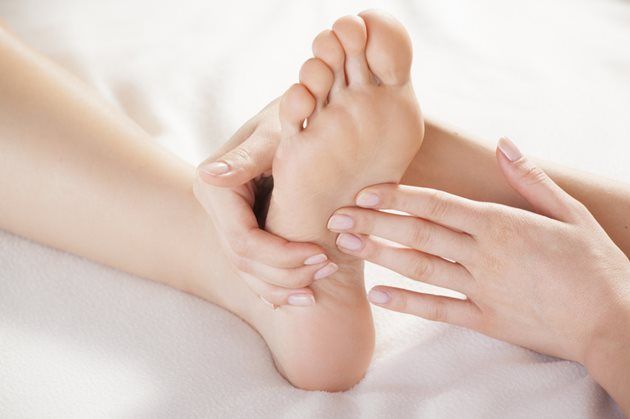Eczema, especially that of the feet, is known as Dyshidrotic eczema and can result in small blisters forming all over the edges as well as the sole of the foot. Needless to say, this condition is an inconvenience at best and intensely painful at worst. The blisters are incredibly small but also incredibly itchy, making them hard to ignore when the condition flares back up.
Dyshidrotic eczema is twice as common in females as it is in males and tends to flare up around allergy season. Eczema can rear its ugly head due to stress, allergies, a vitamin deficiency, or really any outside factor that can upset the skin. Contact with metals like nickel, cobalt, or chromium are also known to be a large factor in the development of eczema.
Regardless of the cause, know that there are some solutions that make the condition much easier to bear. There’s no cure for dyshidrotic eczema, but the symptoms can be contained using any of the tips below:
Soak Your Feet
Completely immerse the feet in cold water for 15 minutes at a time about two to four times a day to make the discomfort associated with eczema go away more swiftly. Any soaks should be immediately followed by drying the feet and then applying a layer of moisturizer.
Wear Socks
The itchy sensation can be mitigated very effectively by putting on socks so the feet are slightly compressed, as per the advice of itchylittleworld.com. Be sure to pick socks that are breathable, without proper airflow the eczema will stick around for much longer than had you chose to air them out. That means no shoes, people! Also, since there is an allergic/immune response associated with Dyshidrotic eczema, picking a hypoallergenic material for these socks will do you quite nicely as you’ll prevent it from getting any worse by choosing to put on socks.
Take An Antihistamine
Eczema is partially mediated by the immune system, primarily the release of histamine. The reason the itching never stops on your feet no matter how much you scratch it is because more histamine is released every time you pick at your eczema. So in effect, the more you scratch, the itchier it gets. To best combat the itchiness so you can focus on other things while the eczema resolves itself, taking a non-drowsy antihistamine should be one of the first tools in your arsenal.
Take Care Of Your Skin
At this point in time it’s highly recommended to avoid any other substances that might further irritate the foot. This means avoid walking around barefoot if at all possible. Also, try to use natural soaps when washing that are soft on the skin as opposed to soaps full of harsh chemicals. Soaps branded as mild or lipid-free tend to be gentle on the skin. Speaking of washing your feet, make sure that your shower water isn’t excessively hot. Extremely hot water will further irritate the area affected by eczema, so dial it back a little bit until the situation is resolved.
Apply Steroid Creams
Corticosteroids are effective at reducing the inflammation and irritation associated with dyshidrotic eczema. There are some over the counter steroid creams you can purchase but if these aren’t making the cut, then you should ask your doctor for something more powerful like betamethasone.
Reduce Consumption Of Trace Minerals
As stated before, trace minerals like nickel and cobalt can contribute to outbreaks of eczema as well as prolong a current outbreak. These foods are things like canned meat (tuna included), cashews, many different types of beans, and many different types of nuts. Unfortunately, chocolate is also on the list, but cutting back on any of these foods will see your symptoms clear up much faster.
Manage Stress
Since stress is known to contribute to outbreaks of eczema, make sure to try and eliminate or minimize any sources of stress in your life. Deal with outstanding responsibilities as they come and don’t let yourself get too far behind or into any dicey situations. Tea is also known to reduce stress and help people relax after a full day. While it might seem odd that your mental state can have such a profound effect on your body, it’s just how eczema works.
Foot eczema for many is a condition that will be lifelong in its resurgence, but luckily treatment options are plentiful so there’s no need for it to affect your life in any major way. Remember that eczema is an immune reaction and anything that works to help skin irritation or impaired immune function will work to make the condition more bearable. Best of luck!











